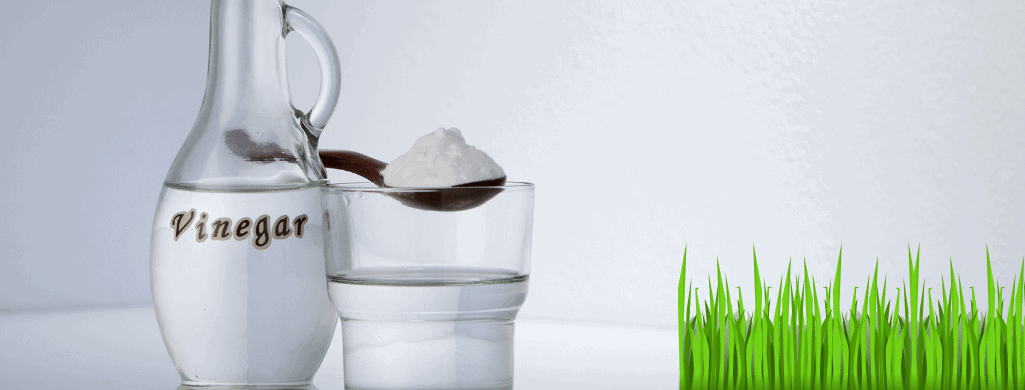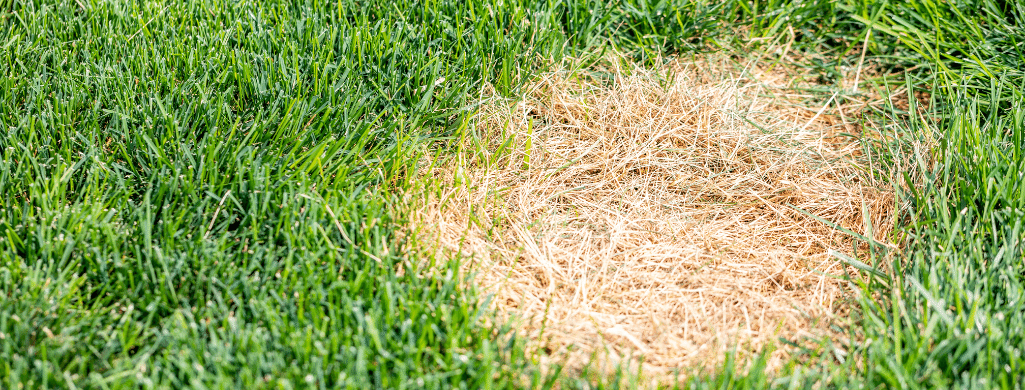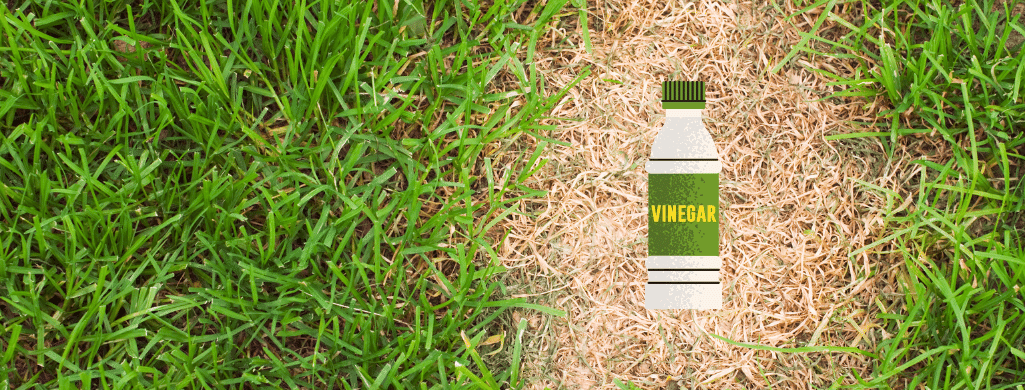Household vinegar is a common cleaning tool.
Yet, if you use a spray bottle to wet your lawn, the results will likely disappoint you.
Does it spell out the end if some regular vinegar gets on your lawn? Will grass grow back after vinegar spills on it?
If you get white vinegar on your lawn, it doesn’t always mean you have to start your lawn all over. In general, grass will grow back after vinegar as long as the grass is mature enough to handle it. If your grass seedling is two weeks old or less, household vinegar will likely kill them.
This means there is a chance to still save your lawn from a vinegar mixture. Here, we’ll look at what to do and the chances your lawn will recover.

Table of Contents
What Happens If You Put Vinegar on Grass?
A vinegar solution isn’t unheard of as an herbicide. Like many herbicides, this one will damage your grass if it comes into contact with it.
While not a dangerous chemical like many herbicides, vinegar will still damage almost any plant it comes into contact with.
Of course, higher concentrations of vinegar are more likely to do more damage quicker, but any amount of vinegar on your grass will likely cause damage.
Still, the acetic acid found in household vinegar isn’t quite strong enough to kill weeds and grass down to the root.
So, unless your grass is very young, you will likely have a chance to nurse your mature grass back to health.
Does Apple Cider Vinegar Kill Grass?
There are, of course, different types of vinegar. Compared to white vinegar, you likely won’t run into exactly the same results if you spill apple cider vinegar on your lawn.
Apple cider vinegar is acidic like white vinegar, and it’s a nonselective herbicide.
The same rules apply, however.
While the material will damage your grass and any broadleaf weeds it comes into contact with, it’ll grow back in time so long as the grass isn’t too young.
Because of this, neither type of vinegar is truly an effective weed killer for the long term on a single application.

Will Diluted Vinegar Kill Grass?
Yes, even if you aren’t pouring a quart of vinegar directly on your lawn, it still poses a threat to grass plants. Even if the vinegar is diluted, it’s likely to damage plant growth and kill grass, weeds, and broadleaf plants.
Yet, diluted vinegar is far less harmful than high concentrations of vinegar. Diluting vinegar as much as possible by following a spill with plenty of clean water can give your grass a better chance of survival.
Will Vinegar Kill Grass Seeds?
While vinegar kills plants without much discrimination, fresh grass seed might survive the encounter.
This is because grass seeds often have a protective coating. This coating is strong enough to allow the seeds to withstand the vinegar and germinate. Once the seed germinates, the young grass seedlings remain vulnerable for a few weeks.

Will Weeds and Grass Grow Back After Vinegar?
When you use vinegar on weeds, brush them over the leaves, and they die within 24 hours. However, you’ll have to repeat this process if you want to stick with a vinegar weed killer.
This is because vinegar doesn’t stay in the soil in your yard for very long. So, once the vinegar has washed away, the weeds can grow back just like before.
Without reapplication, tackling pesky weeds with vinegar is only a short-term solution.
When Will Grass Grow Back After Vinegar?
As mentioned, your grass still stands a chance after it comes into contact with the acid in vinegar.
Diluting it will help, so as soon as you get any quantity of vinegar on the grass, pour a lot of water on it. Hosing it down with a garden hose is an effective way to do this.
You’ll still need to give your grass time to grow back.
Once again, you likely won’t have to worry about growing new grass from seeds. Instead, just wait seven to 10 days, and you’ll see your grass start to revive itself and return.
If your grass is less than a week or two old when applying vinegar, it might kill the grass completely. If this happens, you’ll need to give the grass time to grow from seeds.
How Long Does Vinegar Last in Your Yard?
As mentioned, vinegar doesn’t stay in your yard very long. After about two or three days, the vinegar will likely be gone without much trace.
If you experience stormy weather or heavy rains, the vinegar may wash out of your yard even faster.
Can You Plant Grass After Using Vinegar?
If grass kills off your vinegar, it’s possible to plant new grass in its place.
Yet, waiting two or three days to let the vinegar get out of your soil is worth waiting for. After about three days, you’ll be able to plant any grass seed you want to plant like new.
How Long Does It Take for Vinegar to Kill Grass?
When you spray your plants with a vinegar solution, you may not see them wither and die before your eyes like magic. It doesn’t take long, either, though.
Still, you might see signs of wilting within moments of applying the solution, especially if you’ve spilled high concentrations of grass on the vegetation.
As non-discriminate as it is, remember vinegar will kill non-target plants on about the same timeline.
How Do You Treat Vinegar-Stained Grass?
To start, use a garden hose to spray the area down. The idea here is to dilute the vinegar with water. This can help reduce the effect it has on your lawn. The faster you tackle this step, the better your chance of saving your lawn.
Beyond this, you’ll have to wait for the grass to return to full health. If the grass is very young, you may have to reseed and start from scratch.
Further Reading: Baking soda: Will it kill weeds and grass?